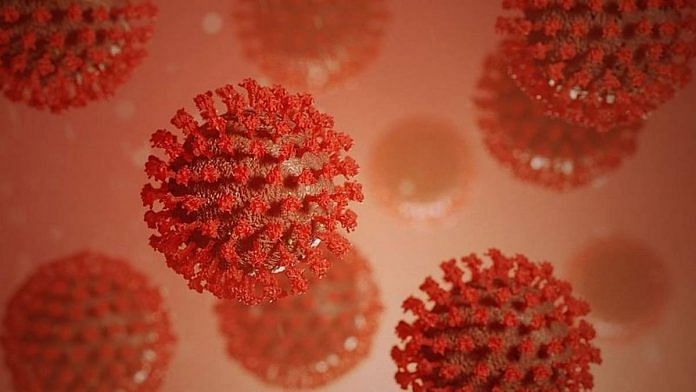Bengaluru: A new study has revealed that in mice whose brains were exposed to the spike protein of the SARS-CoV-2 virus, which causes Covid-19, anxiety increased and cognition reduced. This was also accompanied by the protein causing poisoning of neurons in the brain, leading to neuronal death.
The behavioral study, whose findings were published last week in the journal Scientific Reports, was conducted on mice brains using the part of the spike protein called the S1 subunit. Researchers injected the protein into mice brains and observed their behaviour through tests. They noted that the protein did not directly cause cell death; instead, it induced toxicity into the supporting cells around a neuron, called glial cells.
The findings explain some of the mechanisms behind the phenomenon of long Covid, where patients who have recovered from the viral infection tend to feel a range of neurological symptoms — such as reduced cognition, concentration impairment, mood disorders, fatigue, breathlessness, anxiety — for several weeks to months after infection. Studies have increasingly pointed to the effect of the virus on the brain as the explanation, as more findings of long Covid, which affects nearly a third of those infected, come to light.
Such studies on molecular mechanisms through which different parts of the virus affect our cells show the varied pathogenic or disease-causing mechanisms that are at play during a Covid infection.
Also read: Oxford study on long Covid says even mild infection spurs ‘brain shrinkage’
The fallout of long Covid
Since the early days of the pandemic, many patients had reported lingering symptoms several weeks to months after they recovered. The symptoms that were primarily reported were fatigue, shortness of breath, and brain fog.
Today, we know that anywhere from a third to over half of the Covid patients experience extended symptoms for up to six months. These symptoms tend to be mostly neurological, triggered by the virus’ effect on the brain and the spinal cord, and thus the central nervous system.
Common long Covid symptoms now include fatigue, breathlessness, and brain fog, but also impairment of memory, reduced cognition, increased anxiety and depression, mood disorder, insomnia, shrinking of the brain, continued hair loss, erectile dysfunction or impotence, diminished sense of smell, the onset of diabetes and heart disease, lung dysfunction, tinnitus or buzzing in the ears, and more. Furthermore, such symptoms can be triggered by a mild or non-hospitalised Covid infection as well. Over a third of people who suffer extended symptoms experience them for over a year.
Recently, there has been a surge of research into long Covid, owing to now widely available data. Studies have found many factors that trigger it, including type-2 diabetes, but what causes it and how it can be prevented is still a mystery.
Also read: Covid patients from 1st & 2nd waves can still feel buzzing in ears, doctors say it’s a concern
Key findings of the study
To understand if the brain-infiltrating S1 protein subunit is involved in neurological problems, the team used mice and directly introduced S1 proteins into regions of the brain that process emotion and cognition. They then subjected the mice to a series of behavioral tests to check how their brain function and thinking had been affected.
Mice models are considered a good approximation for human models as they share 99 per cent of our genome and have similar physiological systems. Genetic information is passed down similar to how it is in humans, along with genetic diseases, and their genome is also easily manipulated.
Since they have a short lifespan of just two years, they can be used to learn about chronic diseases and ageing. They are also small, easy, reproduce quickly and are economical to maintain. They have been studied in the lab for over a century, so their metabolic and physiological processes are thoroughly understood and documented.
The team found out that while the mice did not show any change in their ability for movement or locomotion, their thinking was significantly hampered when recognising new objects as compared to the normal mice used as controls. In maze and chamber tests, the protein-injected mice exhibited anxiety, spending more time in closed spaces away from other mice.
The researchers further noted in scans and chemical analysis that there was a significant reduction in the cell density of neurons in the brain regions where the S1 protein was injected, going up to 35 per cent. The authors examined the cells around neurons, called glial cells.
Glial cells are located inside the nervous system and provide physical and metabolic support to neurons. This includes insulation and protection, communication, and nutrient and waste transport. When these cells are ‘activated’, their immune response is to produce a lot of inflammatory cytokines or proteins. This then affects neurons by inducing toxicity, leading to a host of manifested symptoms, including fatigue, insomnia, and depression.
Since previous studies have also shown glial cell activation among those who died of Covid, the authors examined these cells in the test mice. They found that over 60 per cent of glial cell activation was recorded in the mice’s brains.
They conclude that all the findings taken together show that the spike protein of the virus induces neuronal cell death via glial cell activation, and also causes heightened anxiety as well as reduced cognition.
(Edited by Manoj Ramachandran)
Also read: What is ‘Long Covid’ and why some patients who have recovered continue to feel ill for months



